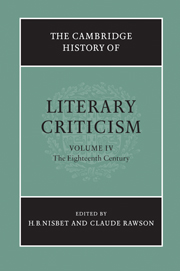2 - Ancients and Moderns
from INTRODUCTION: CRITICISM AND TRADITION
Published online by Cambridge University Press: 28 March 2008
Summary
What the ancients have taught is so scanty and for the most part so lacking in credibility that I may not hope for any kind of approach toward truth except by rejecting all the paths which they have followed.
Descartes, Traité des passions de l’âme (1649)It is the disease of the times, reigning in all places. New Sects: new religions: new philosophie: new methods: all new, till all be lost.
Meric Casaubon, Treatise concerning Enthusiasnte (1656)It has become almost a cliché among historians of our century to say that, although once dismissed by the likes of Macaulay as a trivial spat confined to literary folk (a mere Battle of the Books), the Quarrel between the Ancients and the Moderns (as it was named by Hippolyte Rigault in his Histoire de la Querelle of 1859) was in fact a watershed - that in the Moderns' rejection of the authority of the Ancients, their texts, and the rules drawn from them, we can locate the birthplace not only of eighteenth-century criticism but of modern thought. In 1920 J. B. Bury (following the lead of French scholars) identified the seventeenth-century Quarrel, especially the works of Fontenelle, as the site where ‘the first clear assertions of a doctrine of progress in knowledge were provoked’, making possible the full-scale theories of human progress of the Abbé de Saint-Pierre, Turgot, and Condorcet, which Bury found characteristic of the period. In parallel with Bury, Richard Foster Jones began an inquiry into the background of the English Battle of the Books, which resulted in his thesis that with their rejection of the Ancients' doctrines of authority, imitation, and degeneration, the Moderns - preeminently Bacon and his puritan followers - produced the activity we know as modern experimental science; in the process, Jones sought to establish both that the Quarrel was not solely a ‘literary’ matter, and that its origins were not in the France of Descartes and Fontenelle but in England.
- Type
- Chapter
- Information
- The Cambridge History of Literary Criticism , pp. 32 - 72Publisher: Cambridge University PressPrint publication year: 1997
References
- 27
- Cited by

